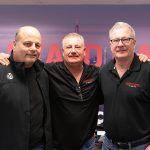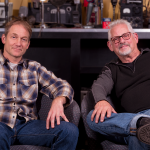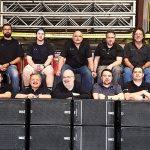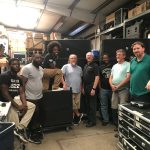The votes have been tallied – the regional winners of the FOH Hometown Hero Awards are…
In the world of pro audio, regional soundcos are among the hardest working people in the biz. Often involved in a multitude of markets (concerts, corporates, HOW) and offering a variety of services, they work hard to stay competitive in a hyper-competitive market. Often overshadowed by their national touring big brothers, these unsung heroes of the audio world deserve recognition for their hard work and contribution to the industry. The 2008 FOH Hometown Hero Awards are picked from a selection of several regions around the United States and Canada. The regional soundcos are both nominated and voted on by their peers. Winners from each region become the nominees for the annual Hometown Hero/Regional Sound Company of the year at the 2008 Parnelli Awards ceremony in Las Vegas. FOH profiled each region’s winning soundco to uncover their secrets to success.

MIDWEST
Great Lakes Sound
Bill Robison got into the sound business while working with some of the hardest working musicians in the Midwest. It was the mid-1980s and the bar band business was booming with bands calling for relatively sophisticated PA and lighting rigs. As his reputation grew he added a couple more bands, tossed in a DJ or two, bought some more gear and then started answering the phone using the name Great Lakes Sound.
In the 20 years since, Robison has been at the helm as Great Lakes Sound has evolved from a local music sound company to a supplier of corporate events at the Edward Jones Dome in St. Louis to a provider of services when political candidates roll through town.
Expanding that base has been crucial to the success and longevity of the company, Robison says. “If you had asked me 15 years ago where our customer base was, it would have been centered around a much smaller number of clients,” he says. “Today, I would like to say that maybe our largest client is somewhere around 10 percent of our business, which is, I think, pretty comfortable. I value all of my clients, but I certainly don’t want to feel that if I lose one client, I am going to go out of business.”
Robison has also guided the company through a series of equipment purchases, including a recent move into digital scenery and media server technology as well as creating smaller equipment packages. “We figure that every five years of so you almost have to restart your game plan,” Robison explains of the shift into a new service. “Technology evolves so fast and what the customer is looking for changes. If we don’t make changes we’re going to stagnate.”
The move was also made with an eye toward today’s economy, reports Vice President Todd Mitchell. “Obviously, the economy is not doing as it once was, and if we can offer customers smaller packages, like smaller sound systems, LED lighting and digital scenery, then great,” he says. “The big concert and festival market sucks right now, and on top of that there are people that are willing to go out and do things for pennies on the dollar. So, for us it was reinventing a new way of doing things. Obviously, we’ve still got a lot of horsepower back there in terms of audio systems, and we do use them, but we’re just trying to be more intelligent with our approaches to things.”
Robison and Mitchell also continue to focus on the needs of companies in the northwest region of Ohio. “It’s good to look at the big regional touring market and what they are doing, but frankly we’re on a much smaller regional level. So, for us it’s a little different,” Mitchell says. “We like to spend our dollars wisely, and the past couple of years it’s been about educating the staff and trying to take a foundation of the business and make it stronger and more stable.”

SOUTHEAST
Atlanta Sound & Lighting
Scott Waterbury had big plans that included nights standing on a stage entertaining legions of fans while playing bass in a band. So, what happened? “A friend of mine asked me to do sound for this new band in the late ‘70s,” he recalls. “Ever hear of Return to Forever? I got my first view of Stanley Clarke and I realized I wasn’t going to be the best bass player in the world, so I’d have to move on to something else.”
Then Waterbury laughs, because his second choice was starting Atlanta Sound and Lighting, and that hasn’t turned out to shabby. “No,” he admits. “I’m the luckiest guy on the planet.” ASL started off supplying backline to bands in the area; Waterbury got into audio because he was consistently coming home disappointed after hearing a band live. “I’d say, ‘Oh, man, that ruined it for me.’ So, we based our company on what’s best for the audience, then the artist and then the promoter,” he explains. “The audience wants to hear good sound, so we’re always going to push in that direction.”
The company works in a number of markets these days, including entertainment, event, some corporate and a little bit of touring. In fact, some ASL staffers recently returned from a short five-city jaunt supporting an act that producer Dallas Austin is creating.
One of the ways that Waterbury is giving back to the Atlanta community, and building some good word of mouth, is by donating lighting and a not-so-seasoned engineer to a local band who is appearing on a local television show. “It works out because the engineer gets experience and the band gets stuff they normally couldn’t afford,” he says. “We have a solid program for helping up-and-coming artists.”
Over the years, the company has grown to include sound and lighting, but Waterbury only made the move into illumination grudgingly. “The guy we were getting lights from was renting them to our customers for less than he would rent them to me,” he reports. “I said to him, ‘Treat me fair or I’ll have to get into lighting, too.” He didn’t, so I got into lighting. It was a really good move for us, though.”
To date, Waterbury has resisted getting into video. “Of course, that means I’ve avoided some good pay checks,” he jokes, “but there are only so many things you can excel at, don’t you think? I just haven’t met the video guy that’s like us.”
To Waterbury, the term “like us” is crucial and it’s one of the main factors why he believes he’s been in business for 30 years now. “I mentioned I’m the luckiest guy in the world and that’s because I attract some of the nicest people on the planet,” he says. “I really get some of the nicest people working for me. They want to do a good job and they understand customer service.”

SOUTHWEST
LD Systems
There are a lot of things to do in high school, some of them legal and some of them make a kid a bit of dough. It’s rare, though, that 30 years later a kid is doing the same thing he did during those post wonder years.
Andy DiRaddo is one of those rarities, since he started a little audio company with friend John Larson while the two were in high school that’s become LD Systems in Houston. Even after Larson left to join the armed services, and Rob McKinley came on as the new partner in 1975, the company retained the name. DiRaddo and McKinley kicked into full gear after the two graduated from Rice University.
“Early on we did sound for bands,” DiRaddo recalls. “We used to do a thing called Country Sunday where a bunch of country arts played. We did a little bit of everything. I remember we pulled out some speakers for a company that was demoing crop duster planes.”
While LD Systems hasn’t provided sound services for a crop duster plane company since, the company’s Production Services team have worked at all kinds of tours, corporate and entertainment events. The company also boasts an install division that has put systems in places like Minute Maid Park and Reliant Stadium.

“I feel like we’ve been fortunate to do a lot of the major events in the city,” DiRaddo says. “We’ve been doing the International Festival now for 25 years and the Houston Livestock and Rodeo for 19 years. We also are out on tour with 3 Doors Down and a couple of other bands. We toured with ZZ Top for five years doing sound and lighting. Lately, we’ve had an upswing in the touring market.”
The company has also worked with a number of major corporations, including an event at Minute Maid Park for a Microsoft convention, Shell Oil’s annual events in Houston and the Jiffy Lube corporate conventions in Orlando and Colorado Springs.
The secret to the company’s success, DiRaddo states, is simple. “We’ve always treated it like a business,” he explains. “Some people view it more as a hobby, but I think part of our strength has been the diversity of things we do, from churches to straight-ahead rock shows to special events. We do every aspect of the business. We have a pretty brisk pace of business through the year and that keeps us going. Obviously, Houston has never been a big entertainment or corporate capital, so we’ve had to do all different things to grow to the size we are today.”

Tied With
HAS Productions
It is said that Las Vegas is a town that runs on something called “juice.” And most people misunderstand juice as “who you know.” Actually juice is not about who you know, it is about who knows you. And these days there are very few venues and promoters in Las Vegas that do not know HAS Productions. The HAS story seems typical on the surface, but dig a little deeper and it gets more interesting.
Yes, owner Larry Hall started as a musician and at some point figured out he was making more money renting his small P.A. system to other bands than he was playing gigs. But that is where the typical part pretty much ends.
First, while Hall was making his musical mark back in South Carolina, he was also getting in his licks as a ranked Golden Gloves boxer and his “day gig” was as a firefighter outside of Charleston. (Yes, THAT Charleston. A year ago, he took a week out of the height of the summer season to go back home and bury nine of his firefighting brethren after a furniture store fire that made national headlines.) And, unlike most of us, he actually had a big degree of success as a musician with a record deal and the whole shot. But we know how such things often go, and a management shakeup at the label meant no more deal. Looking for steadier musical work brought Larry and his family to Las Vegas where there were more dues to be paid. “I cleaned carpets for 13 months before I got a gig,” he recalls. It wasn’t long before he got himself a truck and some more gear and started up Hall Audio Services.
Today, the issue is keeping up with the gigs. From humble beginnings doing club and small casino gigs that the big companies considered “beneath” them, Hall and his crew have turned a reputation for getting the job done right and within budget into gigs that the bigger companies in town now wonder why they are not getting anymore. He added lighting and staging plus extensive backline and changed the company name to HAS Productions. Today, HAS is the “house” provider for properties that include a 6,000-seat arena, outdoor amphitheatres and large showrooms in addition to regular gigs at venues including the Fremont Street Experience (with crowds that can exceed 10,000), Nellis Air Force Base and city- and county-sponsored festivals with single show attendance exceeding 20,000. They were even asked to provide house sound at the Democratic Party presidential debate in Vegas late last year.
While HAS has kept current on gear with line arrays from JBL and DAS plus Yamaha and Soundcraft digital consoles, this is a company that “gets” it. They understand that the best car is useless without a great driver. “Our full-time staff is not huge,” says Hall. “But we know every good FOH and MON guy in the Valley, and most of them work for us regularly. And Danny Lane, my operations guy, has been doing this for big companies including ATK for a long time. We know what it takes to get the job done and we will not rest until the client is happy.”
The payoff of that work ethic and philosophy is that HAS is virtually always asked back when working with a new customer even in the overtly political environment that is Las Vegas and, against the odds, continues to expand. It’s all about juice and HAS has it.
NORTHEAST

MHA Audio
While Mike Scarfe was traveling around the States with the B-52s for the last 10 years providing entertainment for corporate events, he got a first hand look at the workings of regional sound companies. It was a priceless education for a man who was looking to get into the regional business in the Mid-Atlantic area. “I used a new company every week,” he recalls. “It helped me understand what I would need to do to be successful in the regional market.”
Scarfe turned his attention to regional work in 1993, after a touring career that began in 1973. Utilizing his experience in the music business, Scarfe looked to increase his business by selling to corporate and political clients and local promoters. The strategy paid off, as MHA now blends music, political and corporate clients. “I think it is one of the reasons that we are successful because we can bring national quality to a regional event,” he says.
On the music side of things, MHA works at a number of regional theaters, amphitheaters and performing arts venues between Baltimore and Washington D.C., as well as multi-day festivals, such as Capital Jazz Festival, Virgin Music Festival in Baltimore, African American Heritage Festival and Artscape Festival, the largest free arts festival in the U.S.
MHA’s political work runs the gamut from touring with presidential candidates to inaugural balls. The company also provided sound services for the Pope’s recent visit to Nationals Stadium in Washington, and the dedication of the Air Force Memorial in Arlington, Va.
Finding and keeping that variety of work has been one of the key ingredients to success for MHA, Scarfe believes. “I was never tempted, when a lot of others were, to concentrate on only corporate work,” he reports. “A lot of those companies that concentrated on corporate work have experienced serious downturns in their business, particularly during summer months. We don’t have that because we have strong ties to the music market, and we enjoy doing concerts. So, we tend to keep very busy throughout all 12 months because of the range of events. “I always felt that having a variety would serve us well.”
At the same time, MHA has steadfastly remained an audio house. “I’m not particularly interested in lighting or video,” he says. “I’d much rather provide an excellent job at the one thing that we know how to do well, sound reinforcement. People know to come to us for quality audio and knowledgeable personnel.”
More than that, Scarfe believes that clients call on MHA because of the quality of the people working there. Indeed, he is sure that the company earned the Hometown Heroes accolade because of the team of sound techs. “The quality of our people stands out,” he says. “I believe they have won this award and not just the company.”

NORTHWEST
Morgan Sound
It’s as if the folks at Morgan Sound in Lynwood, Wash. play a little game called “PA Chicken” where they pick an event or venue and then see if they can put a package together that will work. Talking heads? Speakers on sticks. Easy peasy. A 70,000-seat festival? Roll out the VerTecs. Nothing to it. College commencements? Events at Safeco Field? Corporate something or others? Not a problem.
Turns out that 35-plus years of experience counts for something, especially when it contributes to the confidence necessary to service a wide variety of gigs in dozens of venues in the Pacific Northwest. Beyond live sound services, Morgan Sound has expanded to include retail sales, electronic and speaker repair and installation. “Live sound has always been the heart and soul of the business, but it’s very diverse,” reports Sound Reinforcement Director Steve Boyce.
While the company has history on its side, Boyce is quick to point out that history is only as good as people remember. “We feel like we have to constantly prove ourselves each time we go out,” Boyce says. “That’s one of our big motivators because there are all sorts of people that would like to take our business from us.”
So, Morgan Sound has dedicated itself as a company that takes great care with each job, paying attention to details and making sure there is constant communication with each client. “If there is an issue that comes up, we are not afraid to bring it up,” Boyce says. “I’ve found that over the years people certainly prefer an honest and open communication more than feeling like someone is trying to pull something over on them.”
As for the next 12 months, Boyce points out that the company will be looking to continue to build its corporate book of business as well as investigating opportunities in music. “I really enjoy the corporate market,” he says. “We’ve found that in the corporate market we can service them very well and they are very pleased that we’re a specialized audio company. Not to be disparaging, but some A/V companies do a little of everything and we’re able to specialize and service them very well. And, for us, it’s certainly less stressful and more economically lucrative for us.
“We all love to do rock shows, we love to do music,” he continues. “But there are so many companies out there that promoters have a wider variety of companies to choose from, and they will play everyone off one another on the quotes and drive the price downward. In this day and age, with trucking and fuel costing as much as it does and capital expenses, I’d rather see the price go the other way. I mean, we’ll continue to do both. It’s just what we do. If the phone rings and we’re available and we can negotiate it, we’re there.”
CANADA

Tour Tech East
Tour Tech East President Peter Hendrickson has been busy this morning trying to find that delicate balance between servicing local clientele and opportunities for a national tour. What’s complicating things for him these days is the simple fact that three gigs — providing sound services for the civic events during his hometown’s annual celebration, a show with The Eagles and an Avril Lavigne Canadian tour — all happen within a week of each other.
Making the decision how best to service each opportunity comes down to looking at the big picture, Hendrickson says. “We could just stay and please the local clients, but if we want to grow the company we’re going to have to look at going outside our normal type of business,” he says.
That might mean bringing in some subs, he adds, especially because appearances (and delivery, obviously) are important. “You don’t want to go into situations appearing that you’re busting at the seams,” Hendrickson reports, “you want to go in with the customer feeling like they are being professionally looked after and they want it to be as seamless as possible. That’s been one of the challenges today for us — just making sure that all the clients are satisfied and that they feel comfortable with what they are being given or told.”
Of course, this isn’t anything new for Hendrickson and the Tour Tech Team who have been working out of Dartmouth, Nova Scotia since 1984. At first, the company only offered lighting services, but over the years Tour Tech East has added sound, staging, power distribution and trucking to its base of business. “Everything that we ended up doing was complimentary to what we were doing right from the very beginning,” he says. “It was just a natural progression.”
While the company has been adding services, Hendrickson has kept an eye on riders to determine what products he should buy. “In the early days, I used to buy what I really liked and what I thought was great. Unfortunately, what I think is great doesn’t always translate to cash, and I can’t grow the business if I only buy what I like. I am in business to stay in business and I can be either right or I can be dead right. I have given up on the dead right.”
With that, Hendrickson has to get back to planning where the company’s gear and engineers will be heading. He knows one thing for sure, which seems to be the key to becoming one of this year’s Hometown Heroes. “No matter how big the gig is, it has to be dealt with professionally,” he says. “What separates the professionals from the non-professionals is that the customer walks away feeling that even though he may not be the Rolling Stones or The Eagles or Toby Keith, that he got treated as well as if he was. That’s what is really important.”



